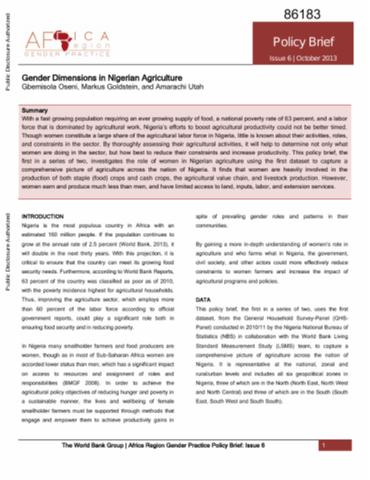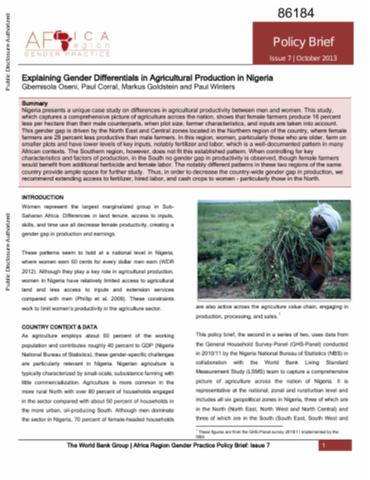The World Bank is a vital source of financial and technical assistance to developing countries around the world. We are not a bank in the ordinary sense but a unique partnership to reduce poverty and support development. The World Bank Group has two ambitious goals: End extreme poverty within a generation and boost shared prosperity.
- To end extreme poverty, the Bank's goal is to decrease the percentage of people living on less than $1.25 a day to no more than 3% by 2030.
- To promote shared prosperity, the goal is to promote income growth of the bottom 40% of the population in each country.
The World Bank Group comprises five institutions managed by their member countries.
The World Bank Group and Land: Working to protect the rights of existing land users and to help secure benefits for smallholder farmers
The World Bank (IBRD and IDA) interacts primarily with governments to increase agricultural productivity, strengthen land tenure policies and improve land governance. More than 90% of the World Bank’s agriculture portfolio focuses on the productivity and access to markets by small holder farmers. Ten percent of our projects focus on the governance of land tenure.
Similarly, investments by the International Finance Corporation (IFC), the World Bank Group’s private sector arm, including those in larger scale enterprises, overwhelmingly support smallholder farmers through improved access to finance, inputs and markets, and as direct suppliers. IFC invests in environmentally and socially sustainable private enterprises in all parts of the value chain (inputs such as irrigation and fertilizers, primary production, processing, transport and storage, traders, and risk management facilities including weather/crop insurance, warehouse financing, etc
For more information, visit the World Bank Group and land and food security (https://www.worldbank.org/en/topic/agriculture/brief/land-and-food-security1
Resources
Displaying 2121 - 2125 of 4907Gender Dimensions in Nigerian Agriculture
With a fast growing population requiring an ever growing supply of food, a national poverty rate of 63 percent, and a labor force that is dominated by agricultural work, Nigeria's efforts to boost agricultural productivity could not be better timed. Though women constitute a large share of the agricultural labor force in Nigeria, little is known about their activities, roles, and constraints in the sector.
Explaining Gender Differentials in Agricultural Production in Nigeria
Nigeria presents a unique case study on differences in agricultural productivity between men and women. This study, which captures a comprehensive picture of agriculture across the nation, shows that female farmers produce 16 percent less per hectare than their male counterparts, when plot size, farmer characteristics, and inputs are taken into account. This gender gap is driven by the North East and Central zones located in the Northern region of the country, where female farmers are 28 percent less productive than male farmers.
Reducing the Vulnerability of the Former Yugoslav Republic of Macedonia's Agricultural Systems to Climate Change : Impact Assessment and Adaptation Options
Agricultural production is inextricably tied to climate, making agriculture one of the most climate-sensitive of all economic sectors. In countries such as the Former Yugoslav Republic (FYR) of Macedonia, the risks of climate change for the agricultural sector are a particularly immediate and important problem because the majority of the rural population depends either directly or indirectly on agriculture for their livelihoods.
Reducing the Vulnerability of Uzbekistan's Agricultural Systems to Climate Change : Impact Assessment and Adaptation Options
Agricultural production is inextricably tied to climate, making agriculture one of the most climate-sensitive of all economic sectors. In countries such as Uzbekistan, the risks of climate change for the agricultural sector are a particularly immediate and important problem because the majority of the rural population depends either directly or indirectly on agriculture for their livelihoods.
Reducing the Vulnerability of Albania's Agricultural Systems to Climate Change : Impact Assessment and Adaptation Options
Changes in climate and their impact on agricultural systems and rural economies are already evident throughout Europe and Central Asia (ECA). Adaptation measures now in use in Albania, largely piecemeal efforts, will be insufficient to prevent impacts on agricultural production over the coming decades. There is growing interest at the country and development partner levels to have a better understanding of the exposure, sensitivities, and impacts of climate change at farm level, and to develop and prioritize adaptation measures to mitigate the adverse consequences.








